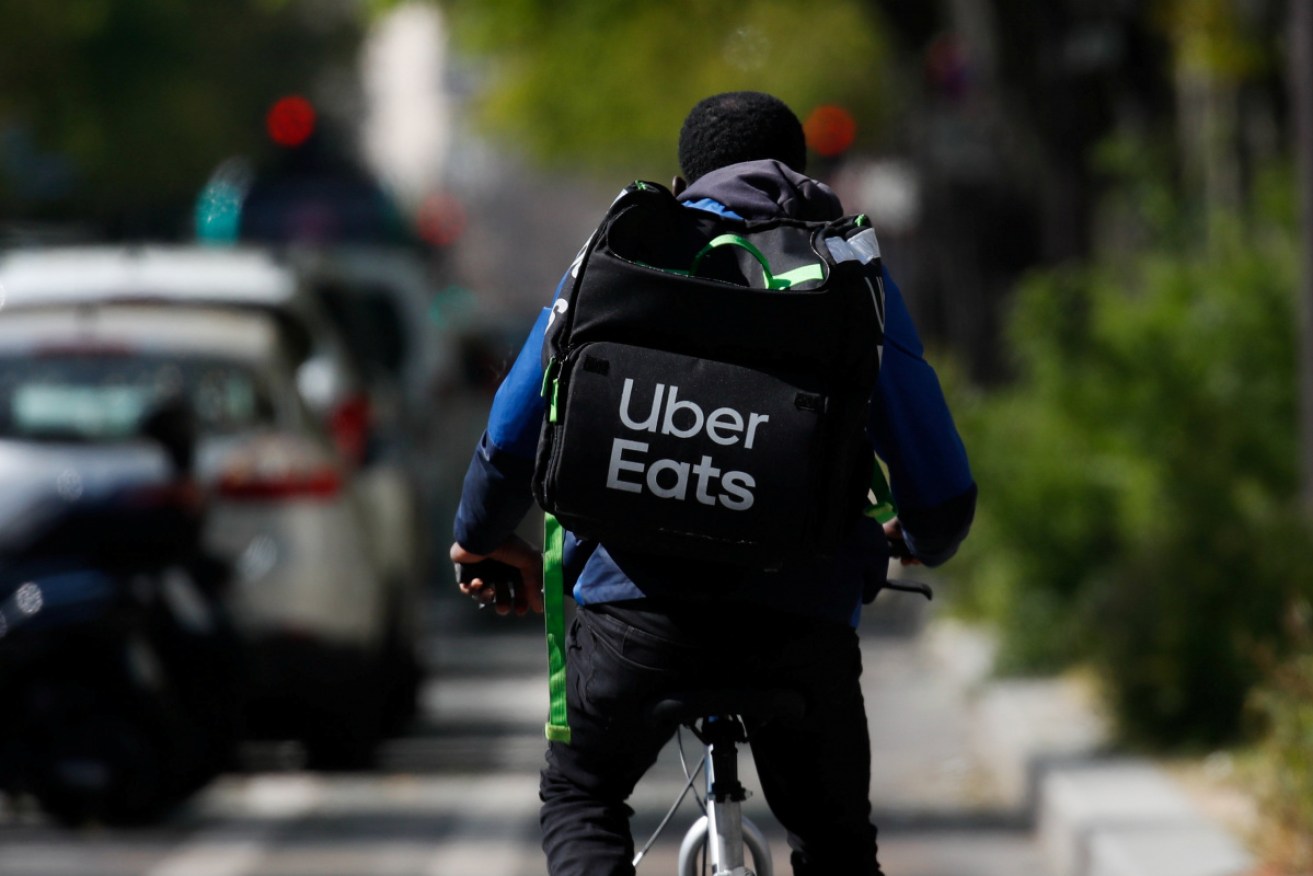Food delivery drivers are overworked and underpaid: Here’s how to help


Gig workers are doing it tough, but there are some ways customers could help. Photo: AAP
Nabin Adhikari, 27, turned his side hustle as a delivery driver into a full-time job to make ends meet when the pandemic hit just after he’d moved to Canberra in 2020.
But he’s since found even when he works up to 85 hours a week, his earnings still aren’t equivalent to Australia’s minimum wage.
“I’ll say [working as a delivery driver is] outrageous, sometimes frustrating … most of the good drivers are only one car repair away from getting to the ground,” Mr Adhikari told TND.
He delivers food for UberEats, DoorDash, MenuLog, and parcels for Sherpa and Drive Yellow, and says the companies are constantly pushing drivers to deliver an “unachievable” number of orders while failing to provide decent pay, or care over safety.

Nabin Adhikari, third from right, met Transport Minister Catherine King, third from left, on Wednesday. Photo: Transport Workers Union
And consumers shouldn’t be fooled by the happy face presented to them at their front doors.
“Even in the culture that I came from … we treat [customers] as a god,” Mr Adhikari said.
“Regardless of how frustrated we are, when we’re dropping off, we go with a smiling face.”
Struggling to pay bills
A study conducted by The McKell Institute found 81 per cent of transport workers in the gig economy rely on the money they earn to pay bills and survive; 41 per cent reported working more than 40 hours per week, but 45 per cent have struggled to afford everyday items like groceries and household bills.
At least 45 per cent of workers in the gig economy, which could represent up to 112,000 workers, reported earning less than minimum wage.
Food delivery workers were the worst off, with more than half paid less than minimum wage.
Michael Rawling, University of Technology Sydney Faculty of Law senior lecturer, said there continue to be “exploitative” arrangements in the Australian gig economy.
Although Australians spend an average of $32 on food delivery services per week, the drivers making the deliveries are not seeing much of that spend enter their bank accounts.
Customers not to blame
Australia is already behind the likes of Spain and Italy, where gig companies like Uber are prevented from classifying drivers as independent contractors, thereby giving drivers standard employee wage and safety protections.
Minister for Industrial Relations Tony Burke is planning to bring forward legislation on gig worker reforms in the second half of this year, which will ultimately aim to give the Fair Work Commission expanded powers to set minimum pay and conditions for gig workers – just as it does for other workers.
It’s yet to be seen how minimum pay set by the Fair Work Commission would work for gig workers.
Companies could choose to cut some of their profits to pay workers more, or they may push the burden onto customers, who would see delivery costs rise.
Transport Workers Union national secretary Michael Kaine said while Australian customers have become used to the convenience of cheap food delivery, most would be willing to pay more to avoid the sometimes deadly consequences of drivers being pushed to their limits.
Since 2017, 11 food delivery drivers have died in Australia.
“The customers are not to blame here,” Mr Kaine said.
“If, as a result of ensuring that workers are paid properly, customers have to pay more, then I think that there’s a social consciousness that has arisen that says, ‘Yes, that’s right’.”
“It’s like our parents used to tell us, if something seems too good to be true, it probably is … We’ve seen a period of time where the gig companies have got away with painting this new way of giving out work as some kind of glossy, fantastic new opportunity, where in fact it’s old-fashioned exploitation via an app.”
How customers can help drivers
Dr Rawling said a good first step to helping gig workers as a customer would be to spread awareness by talking over the issue with family and friends.
A more decisive move would be to choose to support delivery companies that have signed the union charter.
“That’s a really important acknowledgement of the fact that those companies have got on board with the movement towards reform, and the addressing of exploitation of gig workers,” he said.
McKell Institute Queensland executive director Sarah Mawhinney warned against an outright boycott of delivery services.
“I wouldn’t encourage boycotts, because … the people who suffer are the people who are the workers,” she said.
But she said customers should educate themselves about the issues in the industry that’s providing them a service.
For example, people could discuss the multiple deaths of food delivery drivers.
Although these incidents may have helped prompt companies like Uber and DoorDash to come to agreements with the Transport Workers Union in 2022 to improve working conditions, more work needs to be done, and Dr Rawling said the federal government needs to act.








